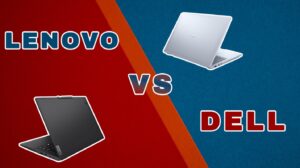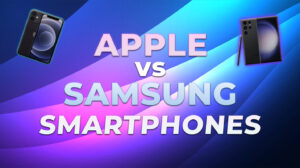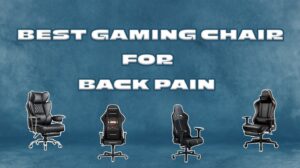Best External SSDs for Gaming and More in 2025
Eneba Hub contains affiliate links, which means we may earn a small commission if you make a purchase through them—at no extra cost to you. Learn more
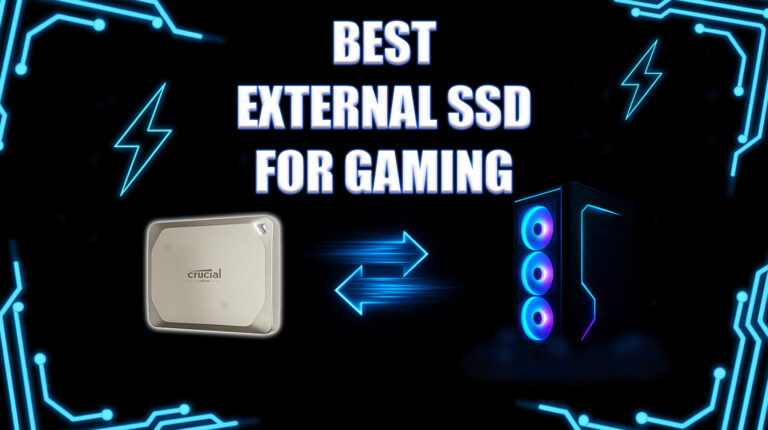
Most people don’t look for the best external SSD for gaming because they need it, but because their drive just conked out. But while extra drives are still very much used for data backup, they can do so much more these days – whether that’s for gaming, video editing, photography, or other forms of content creation. More space is always welcome, no matter how you’re using it.
In this list, I’ll help you run through different models to help you find not just the best external SSD for gaming, but also for your needs.
Jump to:
Our Top Picks for External SSD
While yes, the only things you really need in the best external SSD are space and optionally speed, some of these drives managed to stand out:
- SABRENT Rocket Nano XTRM – blazing fast? Try lightning fast. This external SSD boasts the highest potential read and write speed among all these picks.
- HP P500 – a no-frills, affordable budget SSD.
- Kingston XS2000 – compact, sturdy, fast. Everything you need.
- Crucial X10 Pro – a tough little (and I do mean little) external SSD that’s sure to keep your backups safe from both corruption and external damage.
- WD_Black C50 – while technically not an external SSD, this device was built from the ground up to serve as support for your Xbox Series X/S.
If these don’t tickle your fancy, don’t worry as there are a lot more external drives here to love.
11 Best External SSDs for Smooth Gaming and Data Protection
Let’s get to the brass tacks: if you’re just looking for a backup device, any SSD on this list will do. However, these products also come with extra features that distinguish them from each other. And if you need something more from your SSD, such as the ability to work on files directly on your external SSD with consistent speed, need a rugged design for outdoors photography, or want a drive with protection against both external factors and software, there’s a bit of something for everyone here.
Without further ado, let’s get to the list.
1. SABRENT Rocket Nano XTRM [Best Overall External SSD]
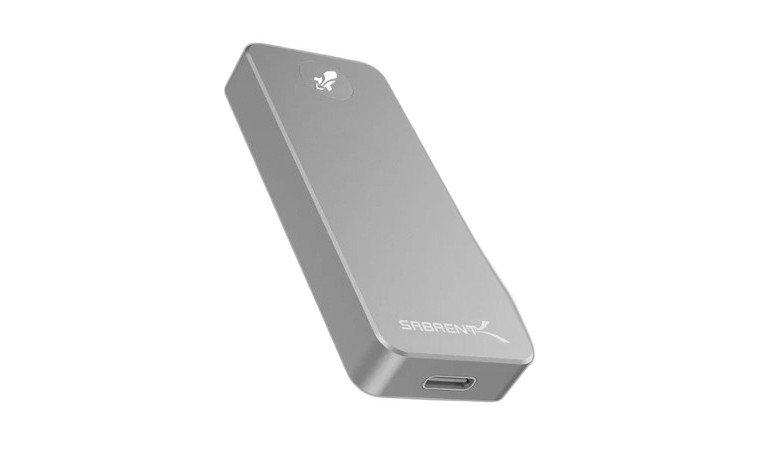
| Specs | Details |
|---|---|
| Capacity | 1TB, 2TB, 4TB |
| Hard Disk Interface | Thunderbolt 3 (USB-C) |
| Hard Disk Form Factor | Not specified (small enough to be a USB flash drive) |
| Works Best With? | Desktop, laptop, consoles |
Even the fastest, toughest, most powerful gaming PCs will break down eventually. And when that happens, you’ll be glad you backed up your data in the SABRENT Rocket Nano XTRM, a lightning-fast drive and overall, the best external SSD on this list.
Like I said earlier on, there are only really two main factors to consider when it comes to picking out a good external SSD: storage capacity and transfer speed. The SABRENT Rocket Nano XTRM has ample space, coming in 1, 2, or 4TB variants, but where it really shines is in its insane transfer speeds of up to 2,700MB/s (via Thunderbolt) and it’s this raw speed that makes the SABRENT Rocket Nano XTRM my top pick for the best external SSD for gaming. But even if you don’t have a Thunderbolt compatible device, the SABRENT Rocket Nano XTRM still operates quickly (up to 900MB/s) via USB 3.2, making it a solid choice for non-gamers, too. And despite packing all this power, this external SSD is small enough to fit in your palm!
The SABRENT Rocket Nano XTRM is no slouch in the security department, either. This external SSD comes with a light yet sturdy aluminum frame that both protects its parts and helps with heat management – though I will caution you that it still runs hot due to its speed. An additional silicon sleeve can be used to give the drive extra protection as well.
| Pros | Cons |
|---|---|
| ✅ Unmatched speed if you have a Thunderbolt compatible device; still decent even if you don’t ✅ Tiny profile ✅ Plug-and-play ✅ Aluminum construction helps with heat dissipation and durability ✅ Comes with an extra silicon sleeve for more protection | ❌ Pricey, but you do get the advantage of top-notch speed |
Final Verdict: The SABRENT Rocket Nano XTRM’s phenomenal speeds make this a top contender for the best external SSD for gaming – but it’s also great at moving large files around!
2. HP P500 [Best Budget External SSD]
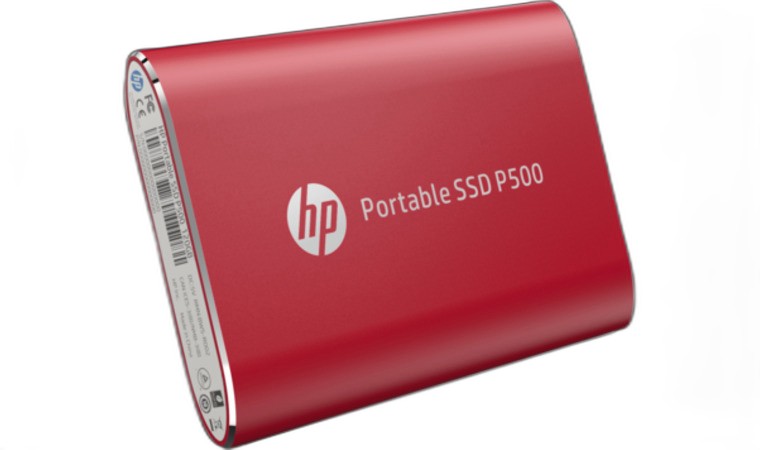
| Specs | Details |
|---|---|
| Capacity | 1TB |
| Hard Disk Interface | USB 3.2 (compatible port needed for max speed) |
| Hard Disk Form Factor | 2.5 inches |
| Works Best With? | Desktop, laptop |
Surprise – HP makes more than just printers. They make external SSDs too, and by all measures, the HP P500 is a pretty great external SSD.
This budget external SSD has a lot of really simple things going for it. It comes in 250GB, 500GB, and 1TB sizes, which you may notice are smaller than most other SSDs (which usually come in 1, 2, and 4TB variants) but also makes the HP P500 much more affordable. It also packs decent transfer speeds, thanks to being an SSD and having USB 3.2 support, with a maximum rate of 420MB/s. A sturdy aluminum shell keeps the drive secure from shocks and drops, but do note that the P500 doesn’t have any IP rating with regards to dust or water resistance, so be sure to keep it in a secure place. Lastly, this external SD isn’t very large at all; while it’s not palm-size like the SABRENT Rocket Nano, it can fit comfortably in a bag or even your pockets.
What really sets this portable SSD apart is its price. True, there are a lot of better SSDs out there in terms of extra features – but the only things a backup drive really needs to have are space and some speed, and if that’s all you’re looking for, the HP P500 is one of the best external SSDs for gaming.
| Pros | Cons |
|---|---|
| ✅ Very affordable price, especially considering this is an SSD ✅ SSD transfer speeds ✅ Plug-and-play ✅ Small and light ✅ Resistant to drops | ❌ No IP rating (dust, water) isn’t stated, so be extra careful when securing this drive |
Final Verdict: Decent space and transfer speeds at a low price make the HP P500 a great budget external SSD.
3. Kingston XS2000 [Best External SSD for More Storage]
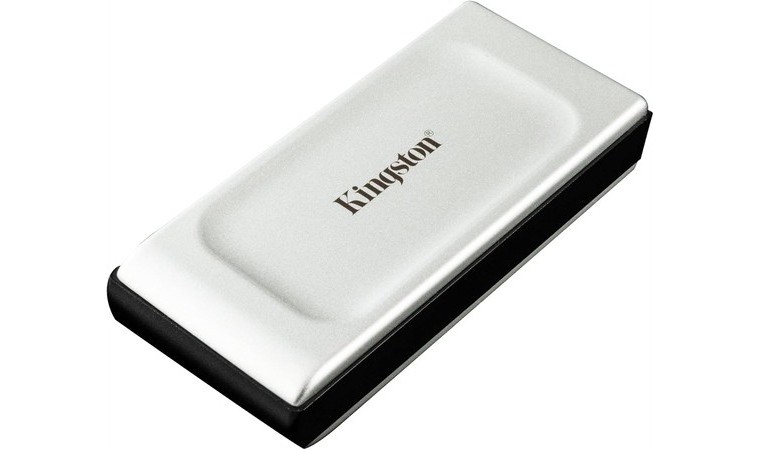
| Specs | Details |
|---|---|
| Capacity | 500GB, 1TB, 2TB |
| Hard Disk Interface | USB 3.2 (compatible port needed for max speed) |
| Hard Disk Form Factor | Not specified |
| Works Best With? | Desktop, laptop |
Despite its frills-free design, the XS2000 is a very solid choice for a portable SSD.
Specs-wise, the Kingston XS2000 is pretty powerful. This portable SSD comes in either 500GB, 1TB, or 2TB variants, but regardless of the size you get, it’s plenty fast, with a touted peak speed of up to 2,000MB/s – which is more than enough to work directly on files on this drive. Do note that to take full advantage of this speed (and as is the case for many of these drives), you’ll need to have a Gen 2×2 USB connection port on your other device as well. This isn’t a necessity though as the XS2000 still has decent speed – but keep that in mind if you’re focusing on this portable SSD’s speeds.
Neither water nor dust will be a problem, as the XS2000 has an IP55 rating. Falls are also nothing to worry about, as the XS2000 comes with a removable rubber sleeve. All of this comes in a very small SSD just about the size of a USB stick!
| Pros | Cons |
|---|---|
| ✅ Small but powerful ✅ Good transfer speeds ✅ Plug-and-play setup for most devices ✅ IP55 rated against water and dust ✅ Comes with a rubber sleeve for extra protection | ❌ Slower speeds if working with non Gen 2×2 compatible devices |
Final Verdict: It may be plain, but the XS2000 is sturdy, dependable, and great for expanding your storage options at a good speed!
4. Crucial X10 Pro [Best Durable External SSD]
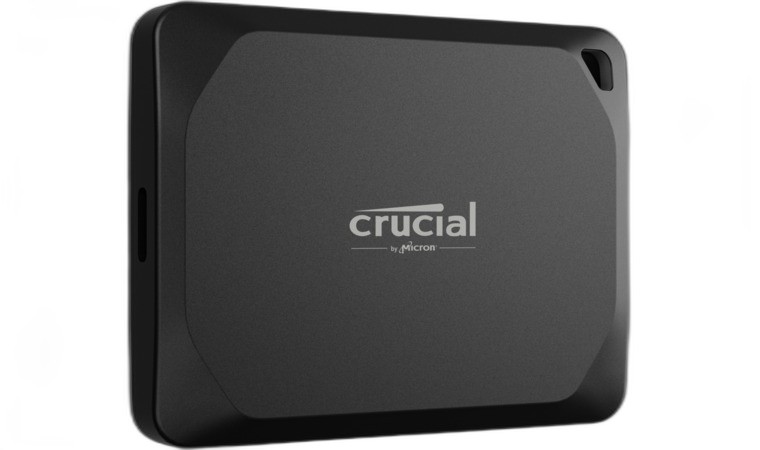
| Specs | Details |
|---|---|
| Capacity | 1TB, 2TB, 4TB |
| Hard Disk Interface | USB 3.2 (compatible port needed for max speed) |
| Hard Disk Form Factor | 2.5 inches |
| Works Best With? | Desktop, laptop, consoles |
Whether it’s for your PC, your tablets, or your gaming consoles, keeping backups is crucial. And if what you want is safe, reliable backups, the Crucial X10 Pro is a solid choice.
This general-purpose external SSD is small but feisty. It comes in 1, 2, or 4TB variants, depending on your storage needs. Regardless of the storage space, each Crucial X10 Pro comes with a USB 3.2 interface, which allows for reasonable read, write, and transfer speeds. Do keep in mind that while this is good speed for an SSD – Crucial markets it as “blazing”, and in fairness you can actually work on your files directly on this drive – I would still recommend moving files to your internal SSD or HDD for more consistent performance. Lastly, USB-C ports ensure great connectivity with multiple devices, from desktop computers to laptops and consoles!
Security-wise, the Crucial X10 Pro is tough yet portable. An anodized aluminum shell with a rubberized soft-touch base gives this external SSD incredible durability as well as resistance to drops of up to 7.5 feet/2 meters. An IP rating of 55 caps off this protection, certifying the X10 Pro as water and dust resistant (not proof!). Lastly, this portable SSD also comes with 256-bit AES hardware encryption for sensitive files, though the software can be finicky to work with.
| Pros | Cons |
|---|---|
| ✅ Small but super sturdy ✅ Tough anodized aluminum shell ✅ IP55 water and dust-resistant, drop-proof up to 7.5 feet/2 meters ✅ Good read/write speeds ✅ 256-bit AES encryption | ❌ Encryption software can be tricky to work with |
Final Verdict: Worried about keeping your data safe from external damage or software corruption? Crucial’s X10 Pro will keep your files protected, guaranteed.
5. WD_Black C50 [Best External SSD for Xbox]
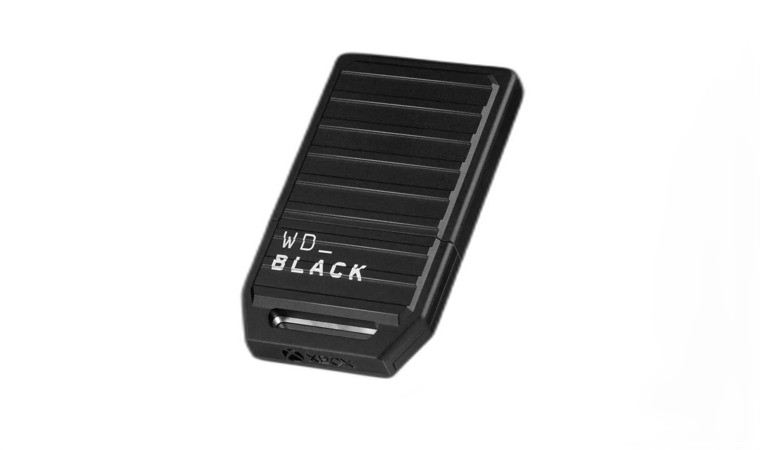
| Specs | Details |
|---|---|
| Capacity | 4TB |
| Hard Disk Interface | USB 3.2/NVMe |
| Hard Disk Form Factor | 2.5 inches |
| Works Best With? | Xbox Series X/S |
Okay, so it’s not *technically* an external SSD, but if you’re playing games on an Xbox Series X/S, the WD_Black C50 is a silver bullet for almost all your storage problems.
The WD_Black C50 is closer to a USB flash drive than it is to an external SSD drive. Manufactured by Western Digital, this drive incorporates Xbox’s Velocity Architecture which makes it function just as – if not better than – the Xbox Series X/S’s internal storage. And since it was built from the ground up to be an auxiliary device for your Xbox, the WD_Black C50 is fully plug-and-play. Just pop it into your Series X/S and presto, more storage!
The WD_Black C50’s real standout feature, however, is direct play. While most external SSDs will work fine when plugged into a console, the WD_Black C50 skips the setup steps and allows you to seamlessly play games straight from the card. You heard me: you can play your Xbox Series X/S games directly from this card!
| Pros | Cons |
|---|---|
| ✅ Games can be run directly from this expansion card, essentially making it extra internal storage ✅ Xbox Velocity Architecture improves read and write speeds ✅ Almost as fast as internal storage ✅ Stylish design ✅ Plug-and-play design, simple (if any) setup | ❌ Doesn’t offer anything special for non-Xbox devices |
Final Verdict: Looking into storage options for your Xbox? The WD_Black C50 should be one of your first picks, thanks to its performance and extra Xbox functionality.
6. Samsung T7 [Best Value External SSD]
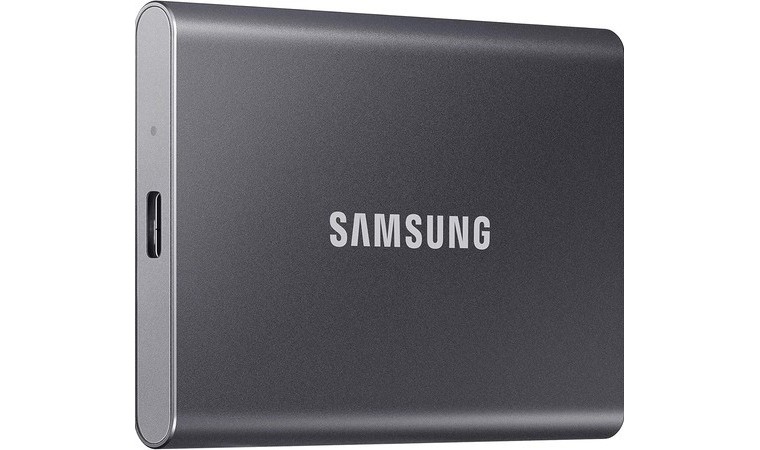
| Specs | Details |
|---|---|
| Capacity | 500GB, 1TB, 2TB, 4TB |
| Hard Disk Interface | USB 3.2/NVMe (compatible port needed for max speed) |
| Hard Disk Form Factor | Not specified |
| Works Best With? | Desktop, laptop, phones |
The Samsung T7 offers great storage space and SSD speeds at a very reasonable price, making this portable SSD my choice for the external SSD with the best value.
Whether you’re gaming straight from the T7 or using it in the field as a photographer or videographer, you’re sure to appreciate this portable SSD’s many perks. With storage capacities of 500GB, 1TB, 2TB, and 4TB, as well as NVMe architecture to improve read and write speeds beyond what SSDs are capable of, almost everyone can get great value from the Samsung T7. Oh, and it’s also small and lightweight, meaning that you can easily use it on the go!
The Samsung T7 comes with a sturdy aluminum body and is certified shockproof from drops of up to 6 feet. This external drive also comes with 256-bit AES encryption, in case you want to back up sensitive files, though this is optional. Lastly, Samsung offers a 3-year limited warranty on this product, so you know they’re confident in their product!
| Pros | Cons |
|---|---|
| ✅ Very small and lightweight ✅ Uses NVMe technology for faster read, write, and transfer speeds ✅ 256-bit AES encryption if you need to secure your files ✅ High-resolution video recording ✅ Shock-resistant up to 6 feet, comes with 3-year limited warranty | ❌ A bit pricey even for a value pick – though you do get your money’s worth |
Final Verdict: Samsung’s T7 is a stalwart external SSD, and its combination of performance and quality make this one worth considering if you’ve got extra money.
7. Netac Z-Slim 2TB [Best Portable External SSD]
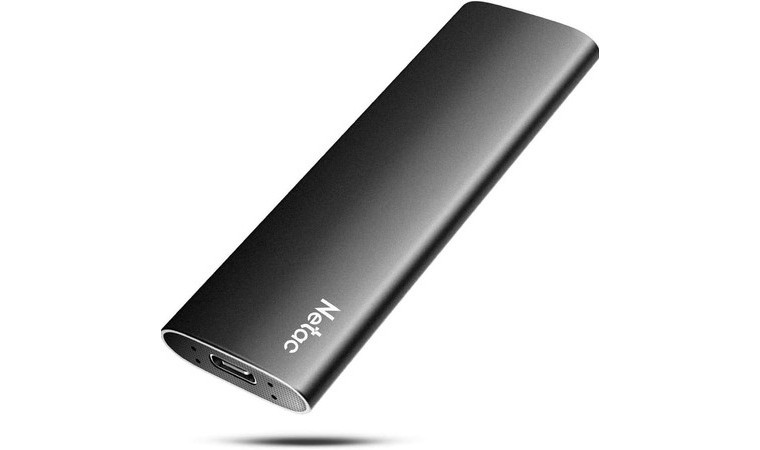
| Specs | Details |
|---|---|
| Capacity | 2TB |
| Hard Disk Interface | USB 3.2 |
| Hard Disk Form Factor | 2.5 inches |
| Works Best With? | Desktop, laptop, consoles |
If size is a big issue for you, the Netac Z-Slim’s tiny profile and decent speeds will probably do the trick.
First, let’s talk about the size, which is probably the first thing that comes to mind when it comes to this external SSD. I know I describe a lot of drives here as small, but the Netac Z-Slim takes the cake; not only is it slim (as the name suggests), but it’s also got one of the smallest size profiles for SSDs. Because the Netac Z-Slim is just about the size of a small USB flash drive, it’s an ideal portable storage solution for anyone who’s constantly on the go since you can just stuff it in your pocket!
But despite its size, the Netac Z-Slim comes with a very sturdy aluminum frame. Said frame is doubly reinforced on the inside, so you can rest assured that your data remains safe and secure inside this drive. Finally, there’s also a limited 3-year warranty on this SSD, so that’s a plus!
I did mention that size is the main draw of the Netac Z-Slim, and some things needed to be sacrificed to achieve its stature. Despite having USB 3.2, this external drive’s top speeds leave something to be desired, with a read speed of 500MB/s and a write speed of 450MB/s; for comparison, most USB 3.2 SSDs on this list – and even those not on this list – tend to have speeds closer to 1,000MB/s, though I will add that 500MB/s is still quite fast. Its size also works against it when it comes to heat management, and it can run quite hot when left running for a while.
| Pros | Cons |
|---|---|
| ✅ Incredibly small profile makes this SSD super convenient ✅ Shock-proof aluminum housing ✅ Reinforced inner frame ✅ Comes with a USB type-C converter cable ✅ Has a 3-year limited warranty | ❌ Not as fast as other SSDs |
Final Verdict: While it’s not the fastest external SSD out there, the Netac Z-Slim is definitely worth considering if you need easily accessible portable storage.
8. Samsung T7 Shield [Best External SSD for Content Creators]
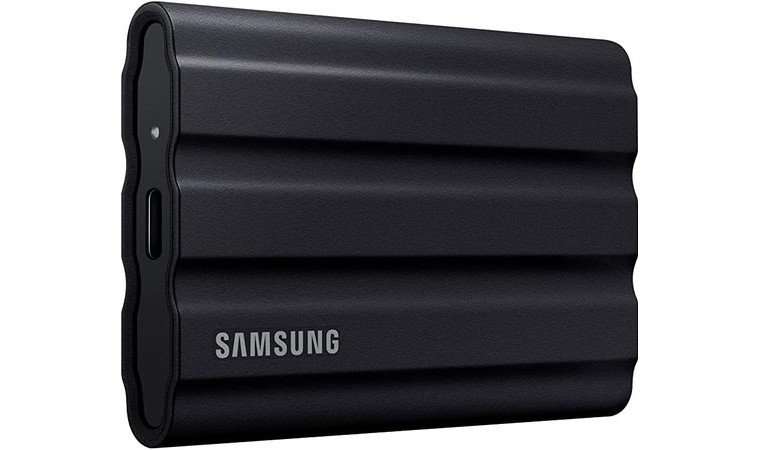
| Specs | Details |
|---|---|
| Capacity | 1TB, 2TB, 4TB |
| Hard Disk Interface | USB 3.0 (with 3.2 connectivity, compatible port needed for max speed) |
| Hard Disk Form Factor | 2.5 inches |
| Works Best With? | Desktop, laptop, consoles, smart phones |
The T7 is already a respectable external SSD, but Samsung went one step further with their T7 Shield, a refined iteration of the same product.
Just as with the base T7, the T7 shield packs a lot of quality in a small external SSD. A USB 3.2 connection speed ensures fast transfer speeds: up to 1,050MB/s sequential read and up to 1,000MB/s for sequential write, but your mileage may vary. Where the T7 Shield differs is in its external design. Unlike the base T7, the Shield comes with rugged casing – most especially a rubberized layer that wraps around its sturdy aluminum body. This isn’t just for show, as the Shield has been rated IP65 for water and dust resistance. The rubberized shell also helps protect this external drive from bumps and falls, and ensures that it rests securely in your hands – perfect for photographers and other content creators who are constantly on the move!
This careful construction also grants the Samsung T7 Shield an advantage when it comes to stability. Thanks to its rubberized design and Dynamic Thermal Guard, this external SSD is very resistant against heat, meaning that you needn’t worry about damage nor latency as you edit your video files on a high-refresh gaming monitor!
| Pros | Cons |
|---|---|
| ✅ Solid, rubberized, and rugged feel ✅ IP65 rated for dust and water resistance ✅ Grooved design helps mitigate falls and ensure the SSD remains secure in hand ✅ Rubberized exterior helps with heat management ✅ Comes with both USB-A and USB-C cables | ❌ A little bulky because of its form; will take some getting used to |
Final Verdict: The Samsung T7 Shield’s added security measures make it one of the best picks for anyone who needs their files safe and sound.
9. Lexar SL660 BLAZE [Best Designed External SSD]
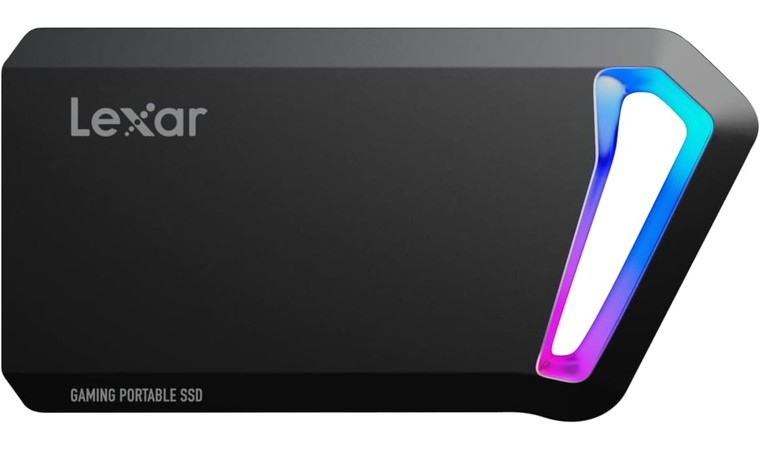
| Specs | Details |
|---|---|
| Capacity | 512GB, 1TB |
| Hard Disk Interface | USB 3.2 |
| Hard Disk Form Factor | 2.5 inches |
| Works Best With? | Desktop, gaming console |
The Lexar SL660 BLAZE is a stylish and dare I say, sexy, piece of hardware. This external SSD is very, very eye-catching – a sandblasted finish gives its dark aluminum frame a powerful appearance, and it comes with both a detachable stand and RGB lighting (via LEDs) to mesh with your system.
This beauty isn’t just on the outside, but on the inside as well. The Lexar SL660 BLAZE is superbly suited for gaming, thanks to its staggeringly high 2,000 MB/s read and write speed via a USB 3.2 connection – more than enough to stream games directly from this drive to your PC or console of choice. Gaming isn’t all this drive can do, though. If you want to use it for security and backup storage, you’ll be pleased to know that it not only comes with 256-bit AES encryption, but also has software that makes encrypting and securing your data a breeze.
While there’s a lot to love in the Lexar SL660 BLAZE, keep in mind that this external drive only comes in either 1TB or 512GB storage capacity variants. This does, however, make it cost much less than its competitors, and its sheer speed mitigates the space problem by quite a lot.
| Pros | Cons |
|---|---|
| ✅ Low asking price despite its quality ✅ Fantastic read and write speeds ✅ Very stylish design and comes with RGB LEDs ✅ Has 256-bit AES encryption software that can also automatically encrypt data ✅ Comes with a (limited) five year warranty | ❌ Only comes in 1TB and 512GB |
Final Verdict: The Lexar SL660 BLAZE is a perfect marriage of form and function, combining superb speeds with an incredibly aesthetic design that’s sure to please gamers.
10. Crucial X9 Pro [Best External SSD for Macs]
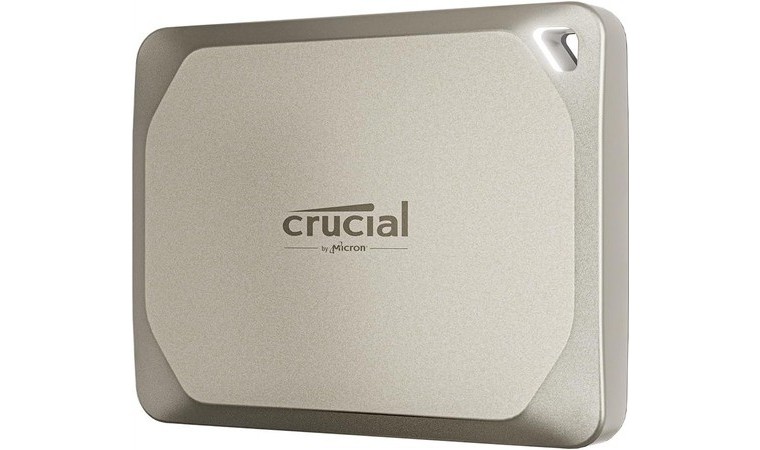
| Specs | Details |
|---|---|
| Capacity | 1TB, 2TB, 4TB |
| Hard Disk Interface | USB 3.0 (with 3.2 connectivity, compatible port needed for max speed) |
| Hard Disk Form Factor | 2.5 inches |
| Works Best With? | Desktop, laptop, tablet, smart phones |
Before we begin, note that this is the X9 Pro, not the regular X9.
The Crucial X9 Pro is a great all-around external drive that is, in many ways, similar to the X10 Pro. It’s got the same storage options, read and write speeds of up to 1,050MB/s (though the X10 is still the speedier of the two), and a tough, anodized aluminum outer shell, complemented by a rubberized soft-touch base. Lastly, it also comes with resistance to dust and water (IP55) and drops of up to 7.5 feet/2 meters.
What makes the X9 Pro stand out is that there’s a version of the product that’s made specifically to work with Mac devices without any fiddling. This version is often referred to as X9 Pro for Mac – though it’s exactly the same product as the X9 Pro – and comes with plug-and-play functionality for Macs, iPhones, and iPads, allowing you to transfer games and other files with little to no problems. The drive also works great with other Apple encryption services, such as Apple FileVault, allowing you to rest easy, knowing your files are safe.
| Pros | Cons |
|---|---|
| ✅ Plug-and-play with Mac devices ✅ Plays well with Apple’s FileVault encryption ✅ Fast read/write speeds ✅ Transfer speed is good enough to work from the drive itself ✅ IP55 water and dust protection, shock tested from drops of 7.5 feet/2 meters | ❌ The X10 is still a better pick if you’re not looking for Mac functionality |
Final Verdict: If you’re looking for a portable external SSD that will play nice with your Mac devices, the Crucial X9 Pro is definitely worth a shot.
11. SSK SD500 [Best Portable External SSD]
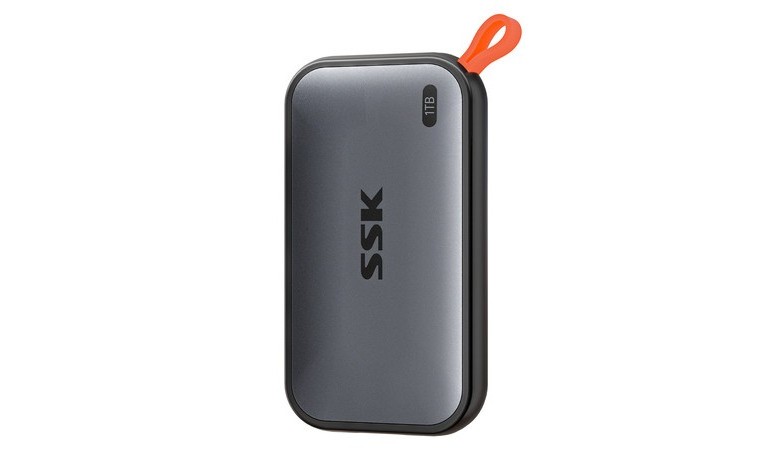
| Specs | Details |
|---|---|
| Capacity | 250GB, 500GB, 1TB, 2TB |
| Hard Disk Interface | USB 3.2 (compatible port needed for max speed) |
| Hard Disk Form Factor | 2.5 inches |
| Works Best With? | Desktop, laptop, tablet, smart phone |
Last but not least on this list is the SSK SD500. If you asked, “who?” in response to that statement, you’re not the only one. SSK is relatively new to the external drive market, but if the SD500 is any indication, its future looks bright.
First, let’s talk specs. Specs-wise, this is a very solid external SSD, which comes in 250GB, 500GB, 1TB, and 2TB variants. These drives incorporate Gen2 NVMe to reach write speeds of up to 1,050MB/s, and are noted for their consistent speeds, whether you’re backing up files from your desktop, mobile devices, or gaming laptop – though once again, your other device must meet the USB standard to achieve these speeds. The SD500 also has both low power use and heat insulation in its frame, so if you’re worried about your externals running hot, that won’t be a problem with this drive. Said frame also comes with protection against drops of 4 feet, though it should be pointed out that SSK makes no mention of dust or waterproofing or resistance. However, the SD500 is also significantly cheaper and very competitively priced compared to other external SSDs and HDs, which is a huge plus!
The catch here is that unlike, say, the Samsung T7 which has the strength of its brand to back its reliability, the SD500 has yet to earn its spurs. By all accounts, the SD500 is a tough little external SSD, but some buyers might feel more confident going with trusted brands instead.
| Pros | Cons |
|---|---|
| ✅ Very reasonable price ✅ Fast and constant read/write speed ✅ Low power use ✅ Comes with USB-C to C and C to A cables ✅ Has heat insulation | ❌ SSK has yet to build up its portfolio |
Final Verdict: While SSK doesn’t yet have a powerful name to back its products, the SD500 is a very nice external SSD at an affordable price.
Best Practices for Backing Up Your Data
Backups! Nobody likes making them (myself included) but when drive failure happens, you’ll be grateful for them. And while making backups can be as simple as copying files from your internal drives to your portable SSDs or USB flash drives, there are some practices that can help you preserve your data even better.
1. Choosing the Right Backup Method
First, it’s important to take advantage of built-in backup features depending on what platform you’re playing on:
- PC players have easy access to backups, whether via external SSDs or cloud storage services such as Google Drive or Microsoft OneDrive. Steam players, in particular, get automatic backups via the Steam Cloud!
- Console players are pretty much in the same boat as PC gamers. Playstation and Xbox players (sorry, Switch) can plug in external drives via a USB port, to serve either as auxiliary storage for more games or for backing up important screenshots, mods, config files, and so on. Xbox players also get free cloud saves, while PS and Switch players must avail of membership plans.
- Mobile players have cloud storage via Google or Apple accounts. You can also back up important data such as photos and videos by plugging your mobile device into a PC then accessing it as a USB drive.
2. Automating Save File Backups
Gamers with access to cloud save services such as via Steam, Google, or Apple typically don’t have to worry about their save files being lost as those are automatically backed up whenever you’re done playing a game. However, some files aren’t saved; screenshots, mods, and configuration settings are usually not covered by cloud saves.
To get around this problem, you can automate the backup process. While some external drives come with backup software, you can also use services like Google Drive or DropBox to sync files across your computer and cloud. Do be careful though, as a sync isn’t a “hard” backup. For example, if you change a file on your desktop then sync it, the new version will be uploaded and the old one will be lost.
The most reliable way to back up your files is to copy and paste them into another drive, whether internal or external. This process can be automated either via batch files/scripts or via third-party tools such as GameSave Manager.
Backing Up Mods, Game Settings & Add-ons
It’s not just your saves that you should back up. While most cloud services do keep your raw save files, files such as mods, configuration files, or other settings are often left behind.
Mods are a very high priority for backups, since they edit the game’s code and can cause a save to be unloadable without the right mods. While Steam synchronizes mods for the games you play, mods you download from other sites – such as Thunderstore or Mod Nexus – are not afforded the same coverage. As mods that add new assets can be quite large, it’s a good idea to back up these mods on fast NVME SSDs with fast transfer speeds. Lastly, be sure to not only back up these mods, but also keep your backups updated, especially when a new version of a mod is published.
You should also make backups of your settings files, such as config.inis or shader presets. While these won’t stop a game from running, it can be annoying to readjust your game settings to just the way you like it.
3. Backing Up Screenshots and Gameplay Clips
Services like Nvidia’s GeForce Experience, OBS, or Windows Game Bar on PC allow you to capture memorable moments and clips from your games. These are also important files worth preserving, especially if you’re a content creator.
Unfortunately, these are classified in the “non-essential” category of files, so you’ll need to manually access their folders and back them up via copy-paste. Due to the large size of high-resolution clips, using a fast external drive such as the Samsung T7 or any of the Crucial Pro series is ideal for both back ups and editing.
4. Using a Dedicated Drive for Gaming Backups
It pays to have different external drives for different purposes. That way, you’ll always know which external SSD or external hard drive to look at for which files.
This organization is especially important for streamers, mod creators, and game developers, who should always have backup files ready in case of any accident. Sure, backing up your latest video project or version update might be a pain due to file size, but you’ll be grateful not just for having a backup, but knowing exactly where you kept that backup!
Testing and Updating Your Backups
Lastly, always check your backups. If the backup data is bad, then the backup is useless. There are three main ways to do this: running your backups every so often, checking your cloud sync settings (where applicable), and copying raw files.
First, you need to run your backups every so often just to verify that they do work. All you really need to do here is attempt to open them, either as-is (in the case of videos or photos) or via loading up a save in a game. Make sure you’re not overwriting your current files, though!
Next, you’ll want to check your cloud sync settings are scheduled correctly. While clouds provide hassle-free backups, you’ll need to ensure that backups are being performed on a regular basis. It’s also smart to manually verify that the files have been backed up by checking your cloud.
Lastly, you can always manually back up important files via copy-paste. Yes, cloud services are nice, but few things can beat the surety of seeing your important files protected yourself.
FAQs
What is the best external SSD for gaming?
If you want pure speed and zero lag when loading games or transferring files, the SABRENT Rocket Nano XTRM is hard to beat. It’s crazy fast (like, blink-and-it’s-done fast), super compact, and built tough. Perfect if you’ve got a Thunderbolt port, but even on regular USB it still flies. Whether you’re gaming on PC or console, it’s a rock-solid pick.
Are external SSDs good for gaming?
Some external SSDs are good for gaming since they’re fast and offer consistent speed. In general, however, you really should be playing games and accessing big files from your internal drives for maximum performance.
What is an external SSD?
An external SSD is an SSD plugged into a console or PC from outside, rather than being connected inside of it. This allows the machine to access the external SSD for storage, reading, or writing.
Can you play PS5 games on an external SSD?
Unfortunately, you can’t play PS5 games on an external SSD. You can store games that you don’t want to download on an external SSD, but to play them, you’ll need to transfer these games to the PS5’s internal storage.
What is the difference between an SSD and an external hard drive?
The difference between SSDs and external hard drives is in the structure – SSDs (solid state drives) provide superior speed and better longevity, since they generally last longer than HD mechanical failure.


